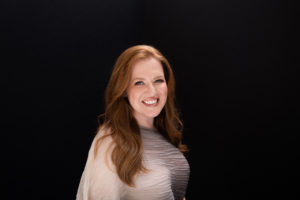
Q & A: Powerful Mezzo-Soprano Jennifer Johnson Cano On Facing Challenging Roles in ‘Sketches from Frankenstein,’ ‘A Song By Mahler,’ & ‘The Hours’
By Matt CostelloJennifer Johnson Cano has garnered critical acclaim for committed performances of both new and standard repertoire. For her performance as Offred in Poul Ruders’s “The Handmaid’s Tale” she was lauded as “towering…restless, powerful, profound, she is as formidable as this astonishingly demanding role deserves.” With more than 100 performances on the stage at The Metropolitan Opera, her most recent roles have included Nicklausse, Emilia, Hansel and Meg Page.
Highlights this season include the premiere of Kevin Puts’s “The Hours” with the Philadelphia Orchestra, Beethoven’s Ninth Symphony with the Chicago and San Francisco Symphonies, and the New York premiere of Marc Neikrug’s “A Song By Mahler” at CMS Lincoln Center. She performs Poulenc’s “Dialogues of the Carmelites” (Mother Marie) with Houston Grand Opera; the world premiere of Gregory Spear’s “Castor and Patience” (Celeste) with Cincinnati Opera; and Bartok’s “Bluebeard’s Castle” (Judith) with Roanoke Opera.
OperaWire recently had a chance to speak with the mezzo about her upcoming work, with a particular emphasis on “Sketches from Frankenstein” and “A Song by Mahler.”
Operawire: I first heard you perform in Gregg Kallors’ “Sketches from Frankenstein” in the catacombs of Green-Wood cemetery. That performance was a shattering, powerful experience for many reasons. (I actually selected it as my operatic event of the year for Operawire).What was it like for you perform in such an eerie, atmospheric setting, with the intimacy of the audience, the candles — and the work itself? (Not to mention Dr. Frankenstein’s creature…so nearby!)
Jennifer Johnson Cano: I loved it! I think that removing the performance from a formal stage or concert hall released both the performers and audience members from the expected, comfortable routine and allowed for a more unique and immersive experience. From a performer’s perspective, we all found ourselves taking more risks and stretching ourselves creatively because our usual theatrical trappings were not available. I felt the audience listened differently. The attentiveness and anticipation were palpable because they just didn’t know what to expect.
At its core, “Frankenstein” is a story about loneliness and a deep yearning for love and acceptance. The catacombs is a space that’s a little cold and damp and unadorned with finery; you are pretty much face-to-face with human mortality. It truly is a conducive setting for personal reflection and seeking to understand the creature’s existential longing.
OW: Can you tell us how it has changed and evolved since you first encountered it? Did you find your own interpretation shifting as the piece develops?
JJC: Gregg’s “Frankenstein” is one of the only pieces I’ve done where I’ve been involved at such an early stage in development. It is super exciting to see it grow in scope from what was basically three scenes at the catacombs to a theatrical work that is now about two hours. With that grander scale, I think Gregg has done an excellent job in teasing out the beautifully nuanced themes in Mary Shelley’s novel—questioning the purpose and path of progress, the nature of our humanity, and how the denial of love places us all in danger.
My interpretation has evolved through the process as I have been given more information and material to draw on. In the last workshop, more was revealed about how my character, Elizabeth, relates and interacts with the other characters. Gregg also wrote her a truly beautiful aria, where she grapples with the human challenge of communicating pain in a compassionate way. I feel fortunate to have played some small part in the aria’s creation. I love singing it and believe other singers will love it, too, when the time comes.
OW: You have two upcoming performances which share some – in my opinion – important emotional resonance; the subjects challenging, even overwhelming.The first I’d like to ask about is Marc Neikrug’s “A Song by Mahler” to be performed February 17 with the Chamber Society of Lincoln Center. Can you tell us about the work, and perhaps share how your personal connection to aspects shaped your role? (And if that connection also brought its own challenges.)
JJC: Marc’s piece focuses on the relationship between a husband and wife, both musicians, and how their lives change when the wife is diagnosed with early-onset Alzheimer’s disease. She is a singer, he a pianist, and their famous encore is Gustav Mahler’s “Liebst du um Schönheit,” which she is able to recall in different ways as her condition progresses. Even when she is no longer able to identify her son or her husband, she remembers the song. And the message of the song itself—to love not for beauty, youth or wealth but rather for the sake of love itself—serves as a touchstone for the big shifts in their lives.
I don’t think Marc would mind me sharing that when he first approached me about joining this project, I declined. My father has vascular dementia and, to be quite honest, the subject matter hit very close to home. I feared I wouldn’t be able to manage the emotional commitment the piece required. Marc, in great kindness and compassion, approached me again, and I felt the universe was giving me a sign. And maybe what scared me about doing the piece was precisely reason I should commit to it and embrace it. One of the marvelous truths Marc captures, and there are many, is the nature of the relationship between the individual with Alzheimer’s and the spouse who becomes their caretaker. I cannot help but think of my parents during each performance and I hope to honor their experiences in sharing this story.
OW: The other upcoming piece, coming in March, is the world premiere of Kevin Puts’ “The Hours” with the Philadelphia Orchestra and Renée Fleming, where you play Virginia Woolf. Again, I imagine this is a role which demands empathy and understanding. What did you do to prepare for the role? And while all performances, I imagine, require getting into the skin and thoughts of your character… in this case, with a gifted writer who struggled, was that an especially difficult challenge? Did it shape your preparations and vocal approach to the new score?
JJC: “The Hours” has been a bit of an obsession of mine since college. I fell in love with Michael Cunningham’s novel and I share equal love for the film, both of which ignited a passion for learning more about Virginia Woolf as a person and her expanse of work. For my New York debut recital, my husband, pianist Christopher Cano, and I programmed Dominick Argento’s “From the Diary of Virginia Woolf,” and through my preparation for those performances, I became more familiar with her diaries and letters. I sometimes joke that I’ve lived with her for quite a while. When the opportunity presented itself to explore more of Virginia, through Kevin’s compositional lens and aural world and on the grand scale of opera, I jumped at the opportunity.
In preparation, I’ve been rereading “Mrs. Dalloway” as well as “The Hours”. I’ve been listening to literary podcasts about Virginia and reading article upon article regarding the many facets of her life and her work, including her journey with mental illness and how it affected and influenced her writing. I’m continually amazed by her—often in awe of her—and find my heart being both broken and mended by her and her words. She lived many universal, human truths, and I think that is why people feel connected to her, why her writing makes us all feel less alone in our struggles. And that connectedness makes my job much easier, because I know I can draw upon times in my own life when I’ve felt alone, misunderstood, euphoric, or brimming with creativity. I am beyond excited for people to experience this piece and how masterfully Kevin and Greg Pierce, our librettist, have shared both the inner workings and outward expressions of this remarkable woman.
OW: You have a wide range of performances this season, including your debut with the Houston Grand Opera in Poulenc’s “Dialogues of the Carmelites” (in January) and the world premiere of Gregory Spear’s “Castor and Patience” with the Cincinnati Opera (in July). Do you as a singer and performer bring a different approach to performing an established piece, such as the Poulenc opera, as opposed to a world premiere? Can one be more exciting (or daunting!) than the other?
JJC: I don’t think my approach changes from one piece to another. With every project, be it part of the beloved canon or a new work, my responsibility remains the same: to serve the music and text and to communicate. Every composer has a unique style and every story is told in a unique way, so I try to do my part through listening, studying and feeling to find possibilities. I avoid seeking “right” answers and try to find something that rings true.
I find every new project I undertake exciting and daunting, whether is it a beloved masterwork or a world premiere. If the work is already well-known, it can be daunting to find peace in knowing, whatever you do, you will, inevitably, be compared to other singers who have performed it. If it is a world premiere, it can be daunting to help introduce it to the world, because first impressions are important. But making music with colleagues and sharing it with audiences is always exciting, and when I focus on that simple act, it ends up outweighing my fears and doubts.



